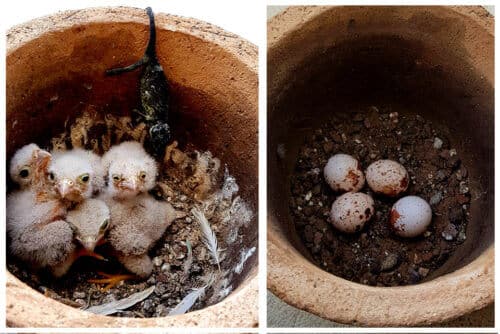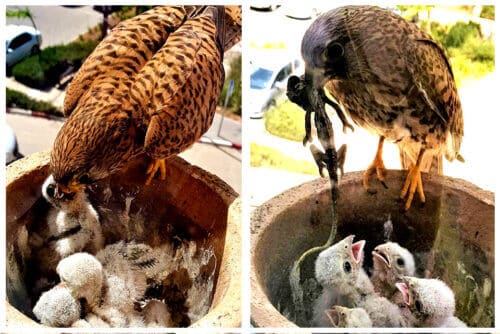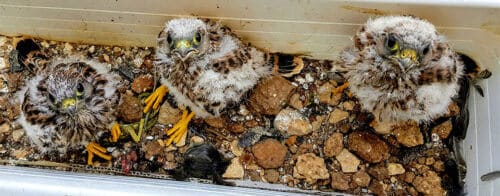In the spring of 2019, the pot in the window of Shlomit ben Meshulam in the Department of Veterinary Resources became a falcon's nest. Shlomit, the secretary of the department, accompanied the chicks until they flew from the nest

Falcons in the window. Photo: Weizmann Institute Spokesperson
In the spring of 2019, the pot in the window of Shlomit ben Meshulam in the Department of Veterinary Resources became a falcon's nest. Shlomit, the secretary of the department, accompanied the chicks until they flew from the nest; A few weeks later she retired after 19 years at the institute. The rumor about the falcons growing on the windowsill spread to the institute, and many people came to watch the miracle. Shlomit, who felt like a proud grandmother, documented the chicks in words and pictures:
"On the windowsill in my office stood a large, empty flower pot. One day a pair of falcons appeared, examined the pot and apparently decided it was suitable for growing the next generation. A few days later the female laid one egg. Three more eggs - small and beautiful, whitish with reddish-brown spots - appeared later. The excitement was great: will she hatch on them? Will they hatch chicks? Will our presence drive her away, and will she abandon the nest?
"The male and the female began taking turns incubating. I soon distinguished them - by a blue-grey head and blacker tail feathers. They incubate alternately: one arrives on duty, and the other goes out to eat. full equality. With great excitement we checked the pot every day: have the eggs hatched yet? We didn't dare to open the window - the fear that the falcons would abandon the nest or that predators would come and harm the eggs, continued to haunt us.
"After about a month, one day it happened: we came in the morning and four sweet chicks, bright-plumed, with demanding beaks, were chirping in the nest. We noticed that one of them was smaller and weaker, and indeed he did not survive. The three strongest remain. The fight of the hungry chicks for the food was tough, and the job of finding and bringing it was not easy either. We mainly saw the mother feeding them, although it is certainly possible that the proud father also carried the burden.
"I must confess that I could hardly work with this wonder in my window: I only wanted to observe life beyond the window: to see the mother bringing food, the relations between the chicks - how they fight over the prey they received and how sometimes out of eagerness they swallowed such large pieces that they almost choked... It's hard to describe how chicks So soft they tore apart and swallowed animals that were sometimes much larger than them.
"The parents were indeed very afraid of our every movement and flew away in response to any movement beyond the window, for example when we approached to watch or take pictures. The chicks, who had already grown when we were part of their environment, were not afraid at all, and only looked at us curiously; They were completely used to us.
“Falcons grow quickly, and feeding three baby falcons was exhausting work around the clock. The mother brought every small animal you can imagine: mice, small birds and chicks of other birds, hornets, and most of all - chameleons. Perhaps a chameleon is slower, and a falcon, a highly skilled hunter, would have been easier to hunt. But the amount of chameleons we saw slaughtered and devoured was crazy. I have no idea how far the mother hen traveled in search of food for her chicks, but the chameleon population in the vicinity of the Institute has certainly dwindled.
"The little ones grew up quickly. The light plumage was slowly replaced by falcon feathers - light brown with dark spots. The beaks got stronger and stronger, and if at first the mother would feed them chewy and soft food with her beak, later she brought bigger animals and taught them how to eat them. The chicks began to crack bones and even kill (if and when the prey remained alive). I know the description sounds terrible, and the sights weren't always pleasing to the eye either. Every morning I had to open the window and clean the glass from the residue that was splashed on it during these meals. But that's life, and we had an incredible and unique opportunity to experience the breeding of a new generation of falcons right in front of our amazed eyes.
"We never stopped admiring the mother's devotion to her chicks. Over time, she got thinner and thinner, probably because she had to go hunting far and wide and provide food for her offspring who could not get enough (there was an old belief that out of every ten hunting attempts, the falcon succeeds in one, which is why the effort is so great). One day I witnessed a truly moving spectacle: she brought game, but did not give it to the chicks, but flew with it back and forth, and again returned and again flew, until finally she placed it in front of them. She was probably so hungry that it was hard for her to give up and not eat herself.
I have no idea how far the mother hen traveled in search of food for her chicks, but the chameleon population in the vicinity of the Lebet Institute has dwindled
"The chicks kept growing and were not afraid of us. Sometimes we would even open the window to take pictures of them up close. They were beautiful, beautiful to be precise, for as they grew it was evident to me that all three were females, for the heads of the males were decorated with blue-grey feathers, while they looked exactly like Iman. Only later did I discover that in the first months of their lives, the falcon chicks resemble their mother, regardless of their gender, but for me they were and remain 'the girls'...
"The pot became very narrow and uncomfortable; They stepped on each other, and there was no room left for the mother. We thought and deliberated, and decided to take action: move them from the crowded pot to a spacious planter. With the cooperation of all the people in the office, we brought a clean planter, filled its bottom with soil - and with gloves on our hands, moved them to her. With great concern we waited to see if the mother would recognize where they were and continue to feed them. A collective sigh of relief was heard throughout the office when we saw that she was coming, and that there was no change in her behavior towards them. Now it was also easier for us to watch what was happening and take pictures.
"The girls kept growing. They began to explore the area outside the 'house'. As soon as they found out that it was possible to get out of the planter, they did so, and we were in a panic - lest they fall down (the office is on the third floor), and they still don't know how to fly... but they knew exactly where they were, they didn't fall, but just walked to them on the windowsill and among the flower pots.
The pot became very narrow and uncomfortable; They stepped on each other, and there was no room left for the mother. We decided to take action: move them from the crowded pot to a spacious planter
"We knew that the day of separation was getting closer. The girls are growing, getting stronger, soon they will fly their way. After all, unfortunately, they are wild animals and not pets... In my life I would adopt one of them. They became braver and braver, trying to fly on the windowsill from pot to pot. They grew so much that people who didn't see them every day like me, had a hard time distinguishing the mother from her chicks.
"The rumor about the falcons growing on the window sill spread in the institute, and many people came to watch the miracle, and they also brought children. As the owner of the window where they chose to build a nest, I felt like a proud grandmother, I explained the process and showed the photos and videos we took along the way. how fun!
"After about two months, the day of farewell came. We came in the morning, and there were only two girls; We saw the third one in the trees opposite. The second flew two days later, and then the third. They came for a short visit at the end of a few days, perhaps expecting to find leftover food, perhaps to say hello and thank you... and flew to them.
I was sad, really sad, but I was happy with all my heart that they grew up, matured and became independent. Maybe they will live in the institute, like their parents? We saw them another time, the three of them sitting on a branch of one of the trees, in front of the window, as if they were dying to say goodbye to each other. Will they find partners and start a family? Maybe they will migrate to another place, with a greater abundance of animals for food? You never know, but I bless the experience in my heart, I thank 'Mother Nature' for conjuring such a wonder for me to witness it so closely and so intimately. So fly your way, beautiful birds - and don't forget me!"


More of the topic in Hayadan:
